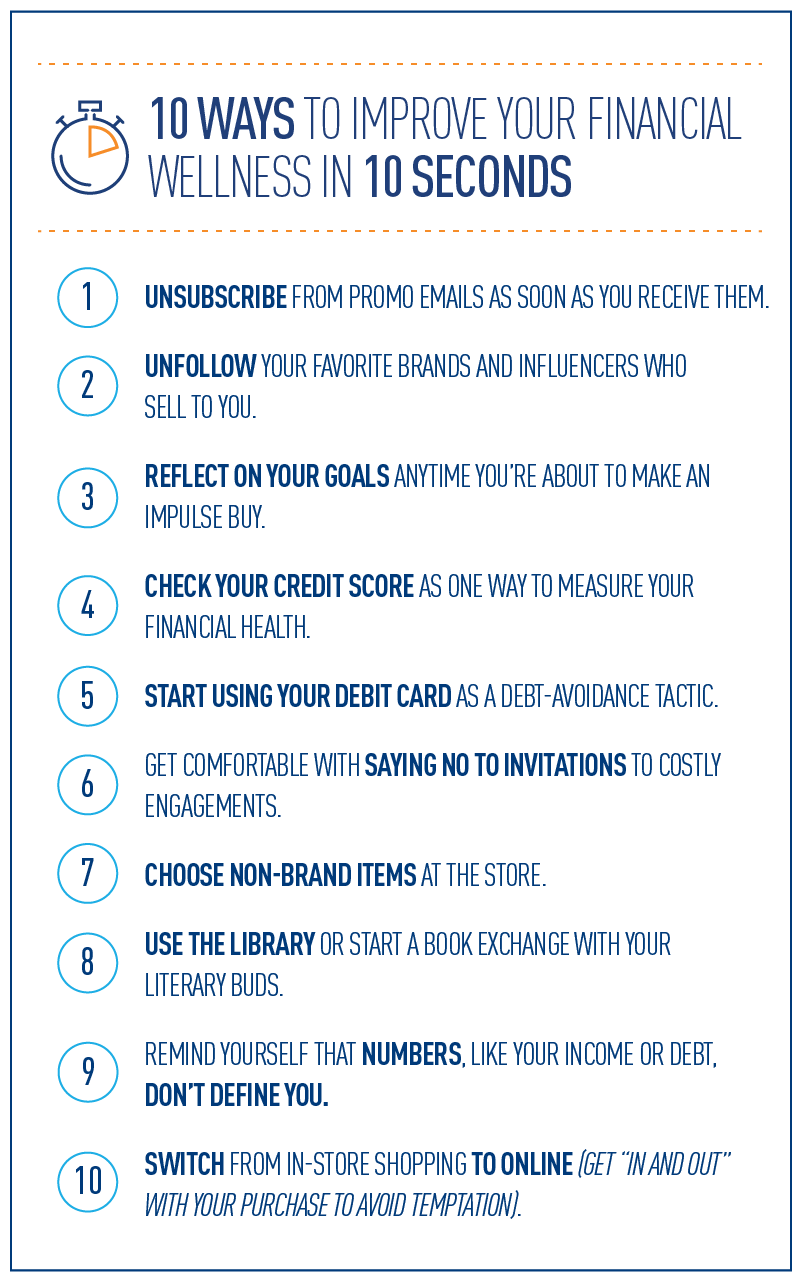
Financial Education
10 tips for improving your finances
In this article
- Smart budgeting: Track your budget using a spreadsheet or budget app. Be sure to look at daily expenses and debt owed routinely. This consistency helps you stay in control of your finances.
- Retirement check: Confirm your enrollment in your employer's retirement plan and explore any matching contributions.
- Subscription review: Glance at your bank statements to spot recurring expenses like subscriptions.
Financial tasks often get relegated to the bottom of the to-do list and can often feel overwhelming. But the smallest tasks can have a positive effect on your financial life. So, we’re listing 10 ways you can improve your finances in 10 minutes or less.
Raise your hand if you live by a busy schedule. Keep your hand raised if your financial situation could use some improvement! Can you carve out 10 minutes? If so, then you can make mini money moves that can help you better manage your finances, save and plan for your future.
In our world of 10-minute workouts and 10-minute meals, we want to help you earn some 10-minute money wins. (Bonus! We also give you 10 quick ways to improve your financial wellness in 10 seconds.)
1. Create a budget update habit
Whether you use a spreadsheet or budget app, the first order of business is to set up your budget at the start of the month. Then try to make entering your purchases from the day into an everyday habit. Daily entries may be a nuisance at first, but once it becomes routine, it’ll help you stay on track and in the budget mindset. You may skip a purchase just because you know you have to enter it! If you don’t use a budget app, take a few minutes to download one and start getting familiar with how to use it.
2. Get your retirement squared away
If you’re unsure if you’re enrolled in your employer-sponsored retirement plan, check your pay stub. Some employers automatically enroll their employees into a 401(k). You can also see if your employer matches your contribution (could you afford to bump it up by 1%?). Don’t see a deduction? Your next step is to learn about your employer’s retirement plan and how to enroll by contacting your HR department or looking in your employee handbook.
3. Consider consolidating your credit card debt
Burdened by credit card debt? If you can't afford to pay your monthly credit card balances, then you may want to enlist the help of debt consolidation. By consolidating multiple credit card balances into one, you can simplify your repayments, get a lower interest rate and save on monthly payments.
4. Scan your bank and credit card statements
It’s a smart idea to regularly give your statements and accounts a quick review. You’ll want to look for any unauthorized purchases and contact your financial institution or card issuer immediately if you catch any fraudulent activity. If you have some extra time, check out your purchases to see if there are any areas where you can cut back.
5. Declutter, discard and donate
Decluttering items stuffed in drawers or sitting in closet corners is both freeing and an opportunity to reflect on your past purchases. Dedicate 10 minutes to decluttering one area of your home at a time, such as your wardrobe or that container filled with old trinkets. During the purge, take a moment to evaluate each item. Was it a worthwhile purchase? The process of discarding and donating old items (that used to be money) is a chance to learn about your past spending habits and change how you buy in the future.
6. Take a pen to paper
Money can be emotional. We apply meaning to it, like attributing it to our self-worth, which is costly to our well-being. Quick journaling can help you strengthen your relationship with money. Grab your beverage of choice and write about a recent money win. It can be as small as adding extra to your monthly credit card payment or reflecting on how far you’ve come within the year. Journaling is also productive for creating a financial goal. Again, it can be as simple as cutting down on digital subscriptions or committing to a month of no frivolous shopping.
7. Invite financial advice into your feed
With all that mindless scrolling on Instagram, why not integrate some financial advice, motivation and inspiration into your feed? Follow @DesertFinancial for money tips and financial information on topics like how to buy a house, financial safety, peer-to-peer mobile payment apps, money lessons for kids, debit and credit and so much more. Most budgeting apps also have social media accounts where they post financially helpful content. You may want to connect with financial influencers who share how they save and manage debt too.
8. Set Up Your Contactless Digital Wallet
Turn your phone into your wallet by uploading your debit or credit card to your smartphone where you’ll store your payment information. To help curb overspending, you may want to keep only your debit card in your digital wallet. This way, you know every time you wave your phone above the reader, money is leaving your account directly.
9. Ditch the subscriptions
Your monthly subscriptions may not be as essential as you think. Take a quick peek at your bank statements and highlight all of your monthly subscriptions like TV streaming services, snack or meal ingredients boxes, or beauty bundles. Take 10 minutes to review your subscriptions and finally, cancel those you can live without.
10. Give your child(ren) 10-minute money lessons
Teaching your kids about money early will help them learn the classic “value of a dollar” lesson and what it means to be financially responsible. Kids who learn the concept of saving and how much things cost can also help your family’s finances too, as the kiddos may ask for fewer things or understand when you say “no.” Break up your family’s financial education into bite-size, 10-minute lessons and get the whole family on board with good financial habits.
You can look at these ten, 10-minute tips as incremental goals to accomplish. Small changes can make a big difference in your spending habits, finances and money management overall. As they say, small victories lead to big rewards!

Related content
Subscribe to our blog
Fill out the form below to sign up for our blog.







